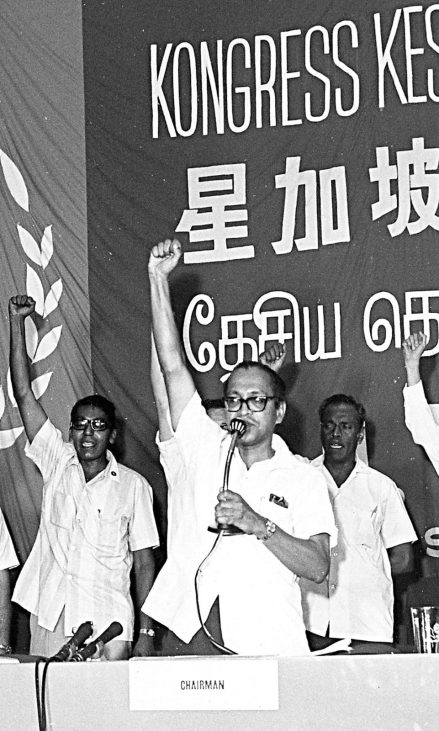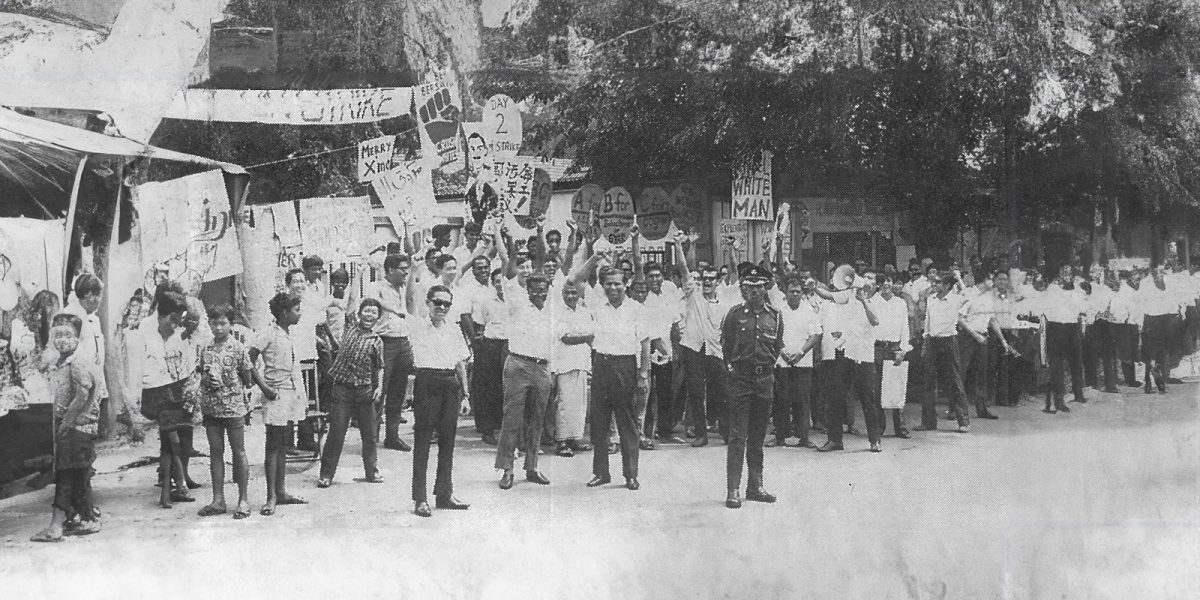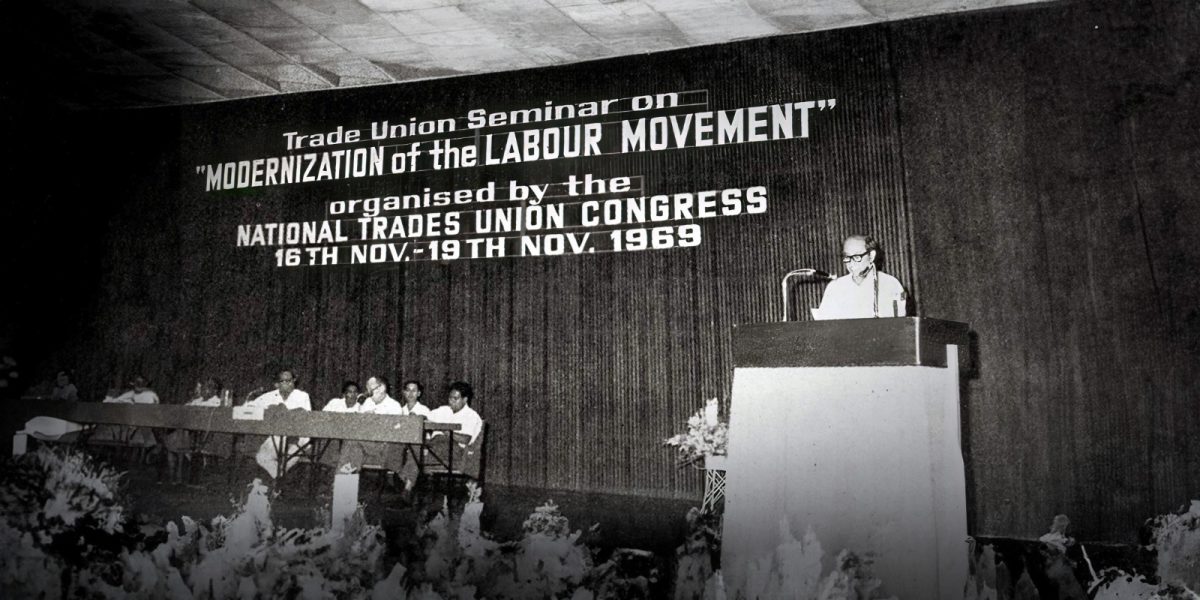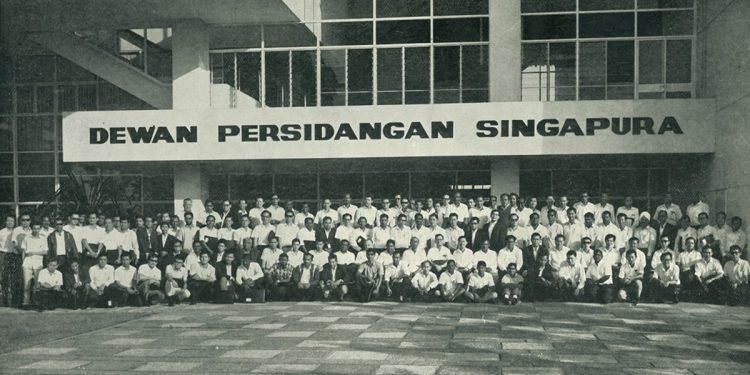Many of you shop at NTUC FairPrice supermarket. But did you know that it was started by the National Trades Union Congress (NTUC) in 1973 to help workers afford groceries and everyday items?
NTUC FairPrice was also created to counter dishonest traders who hoarded these essential goods and profited unfairly.
NTUC aimed to ensure that the average worker had a reliable place to buy reasonably priced essentials within their means. The supermarket also helps to benchmark prices, especially in times of high inflation, playing a part in moderating the cost of living for the people of Singapore.
Read on to discover the turbulent years of NTUC’s birth and what led trade unions to set up social enterprises like NTUC FairPrice.
A Pioneer of Progress: NTUC’s Early Years
NTUC wasn’t the first organisation to bring trade unions under one roof in Singapore.
In 1951, the Singapore Trades Union Congress (STUC) was the labour movement of the day. However, it lasted only 10 years before dissolving in 1961.
During that time, union work was closely linked to Singapore politics. Political parties wanted to connect with the labour movement. They did this to get support from the working class, the largest group in the population.
The People’s Action Party (PAP), which came into power in 1959, strongly advocated Singapore’s merger with Malaysia. However, the party’s pro-communist members were not on board.
Disagreements over the Singapore-Malaysia merger led to a split in the PAP in 1961. Pro-communist members left to create the Barisan Sosialis party.
The PAP split caused a rift within the STUC, and created two rival trade union bodies.
Union leaders who backed the Barisan Sosialis started the Singapore Association of Trade Unions (SATU) in July 1961 with 82 unions.
On 6 September 1961, pro-PAP union leaders founded the National Trades Union Congress (NTUC). It began with only 12 unions.
“A small group of trade unionists who were PAP members founded the NTUC [in 1961]. We were a miserable minority. The fight began. It was a touch-and-go affair.
“I personally thought we were going to lose. I particularly admire my colleagues who also thought we were going to lose, but who determined that we would fight with our backs to the wall and die on our feet and not on our knees. We did not go down,” said CV Devan Nair in Devan, Nation Builder, People’s President.
Mr Nair was an NTUC founding member who served as its Secretary-General from 1963 to 1965, and again from 1970 to 1979.
NTUC’s membership grew steadily from its inception. By Singapore’s independence in 1965, it represented most of the country’s organised workers with 120,000 members.

What Happened to SATU?
Although it started strong in 1961, SATU’s existence, like STUC’s, was short-lived.
Faced with threats to Singapore’s internal security, the Government organised an anti-communist initiative to weaken communism in 1963. Most of the top-level leaders of pro-communist SATU were arrested under the Internal Security Act.
Authorities denied SATU’s registration that same year, two years after its formation, citing its use for “unlawful purposes” and actions “inconsistent with its objectives and rules.” NTUC managed to convince 50 unions, previously loyal to SATU, to become its affiliates.
From the get-go, NTUC was committed to helping workers earn more and have better working conditions in the long term. However, with frequent strikes and lost workdays, worker-employer relations were often strained.

Fortunately, the law was on NTUC’s side. The Industrial Relations Ordinance, introduced in 1960, set out to legally regulate employer-employee relations. The aim was to promote economic growth, create jobs, and ensure workers’ fair treatment and higher wages.
The law paved the way for the Industrial Arbitration Court (IAC) to settle disputes peacefully. The Ordinance reduced the need for strikes and fostered a more stable work environment.
Singapore separated from Malaysia in 1965, becoming an independent nation, and the British military withdrew from the nation in 1971.
The new Government was worried that the British leaving would lead to massive job losses. To create jobs, it wanted to attract foreign investments.
The situation led to new and updated employment laws in 1968 to attract investors. The amended Industrial Relations Act, which replaced the Ordinance, prevented unions from negotiating things, such as promotions and dismissals.
Meanwhile, the new Employment Act limited workers’ benefits, like bonuses and retrenchment payouts.
Unions had their bargaining power reduced, and NTUC experienced a decline in membership.
Unions had to act in the face of this new reality.
More than a Union: Putting Workers at the Heart of Singapore’s Growth
NTUC knew it had to do more than negotiate for better pay and working conditions. So, in 1969, it held the Labour Movement Modernization Seminar to re-invent itself.
“Without a doubt, the labour movement is now at a crossroads … I would like to think that (it) will take the positive road — the road to greater, more responsible and possibly more difficult means of participation in the national life of the Republic,” said then Finance Minister Goh Keng Swee in his speech at the seminar.

The Government encouraged the labour movement to do its part to contribute to Singapore’s growth.
Leaders advised unionists to stop banging tables and striking, and instead, become skilled negotiators to protect workers’ interests better.
Over the next 63 years, NTUC evolved alongside the country and the workforce.
Workers now have better NTUC union membership benefits, with training funding, job search and placement services, and lifestyle perks.
The workforce — now encompassing professionals, youth, women, senior workers, and the self-employed — benefits from NTUC’s targeted support.
Beyond Bargaining: Forming Social Enterprises to Meet Workers’ Life Needs
Another idea from the Modernization Seminar was to support workers’ lives beyond the workplace.
Finance Minister Goh Keng Swee suggested that NTUC create enterprises to provide various social benefits for workers.
The aim? Offer affordable essential goods and services, which could combat inflation, prevent profiteering, and keep prices stable.
The decisions made at the seminar led to the birth of NTUC FairPrice, which was first known as Welcome Supermarket.
NTUC also started other social enterprises that provided preschool services, cooked food, and insurance, just to name a few.
With today’s high inflation, the role of these enterprises is more relevant than ever. For example, NTUC First Campus runs the My First Skool preschool brand, Income Insurance provides insurance services, and NTUC LearningHub offers learning opportunities. Each of these enterprises makes a positive impact on workers in society.
Now that you know NTUC FairPrice does good, we hope you find meaning when you shop there. Knowing they support you, other workers, and the community will hopefully make you feel good about yourself too.

